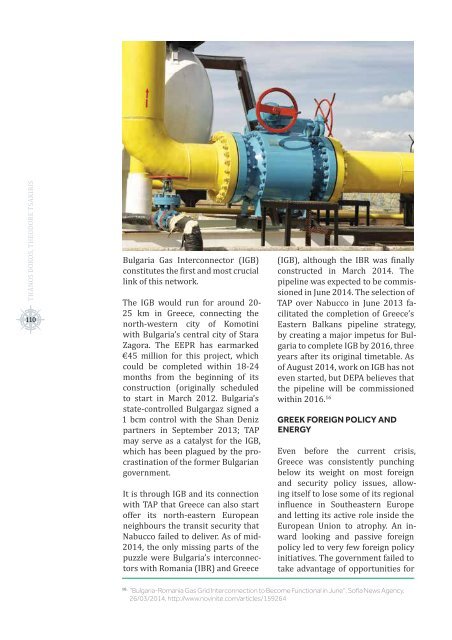Create successful ePaper yourself
Turn your PDF publications into a flip-book with our unique Google optimized e-Paper software.
THANOS DOKOS, THEODORE TSAKIRIS<br />
110<br />
Bulgaria Gas Interconnector (IGB)<br />
constitutes the first and most crucial<br />
link of this network.<br />
The IGB would run for around 20-<br />
25 km in Greece, connecting the<br />
north-western city of Komotini<br />
with Bulgaria’s central city of Stara<br />
Zagora. The EEPR has earmarked<br />
€45 million for this project, which<br />
could be completed within 18-24<br />
months from the beginning of its<br />
construction (originally scheduled<br />
to start in March 2012. Bulgaria’s<br />
state-controlled Bulgargaz signed a<br />
1 bcm control with the Shan Deniz<br />
partners in September 2013; TAP<br />
may serve as a catalyst for the IGB,<br />
which has been plagued by the procrastination<br />
of the former Bulgarian<br />
government.<br />
It is through IGB and its connection<br />
with TAP that Greece can also start<br />
offer its north-eastern European<br />
neighbours the transit security that<br />
Nabucco failed to deliver. As of mid-<br />
<strong>2014</strong>, the only missing parts of the<br />
puzzle were Bulgaria’s interconnectors<br />
with Romania (IBR) and Greece<br />
(IGB), although the IBR was finally<br />
constructed in March <strong>2014</strong>. The<br />
pipeline was expected to be commissioned<br />
in June <strong>2014</strong>. The selection of<br />
TAP over Nabucco in June 2013 facilitated<br />
the completion of Greece’s<br />
Eastern Balkans pipeline strategy,<br />
by creating a major impetus for Bulgaria<br />
to complete IGB by 2016, three<br />
years after its original timetable. As<br />
of August <strong>2014</strong>, work on IGB has not<br />
even started, but DEPA believes that<br />
the pipeline will be commissioned<br />
within 2016. 16<br />
GREEK FOREIGN POLICY AND<br />
ENERGY<br />
Even before the current crisis,<br />
Greece was consistently punching<br />
below its weight on most foreign<br />
and security policy issues, allowing<br />
itself to lose some of its regional<br />
influence in Southeastern Europe<br />
and letting its active role inside the<br />
European Union to atrophy. An inward<br />
looking and passive foreign<br />
policy led to very few foreign policy<br />
initiatives. The government failed to<br />
take advantage of opportunities for<br />
16.<br />
“Bulgaria-Romania Gas Grid Interconnection to Become Functional in June”, Sofia News Agency,<br />
26/03/<strong>2014</strong>, http://www.novinite.com/articles/159264










